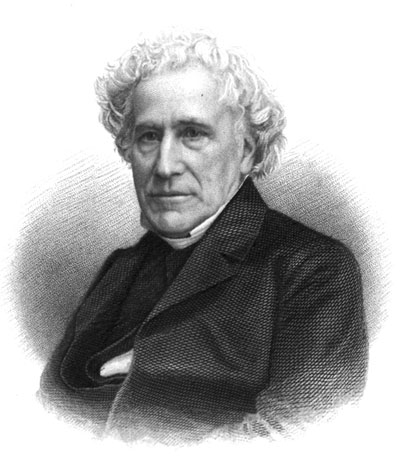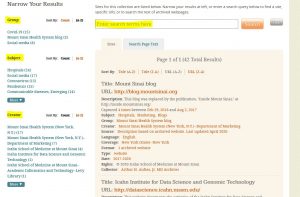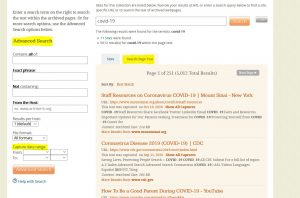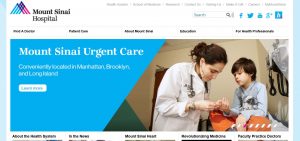Oct 29, 2020
 Mount Sinai Morningside, originally the St. Luke’s Hospital, celebrated the 174th anniversary of its founding on October 16th this year. The true founding date for the hospital is October 18th, the feast of St. Luke on the liturgical calendar. On that day in 1846, Rev. William A. Muhlenberg announced to his Church of the Holy Communion congregation his intention to found a hospital to ease the suffering of the sick poor of the city. It would be a “Hôtel Dieu” (hotel of God), that would treat its patients as guests, with care and compassion, as all the guests are ill. Founder’s Day honors that spirit of care and compassion as the staff continues to put patients first, keeping our values of empathy, optimism, safety, transparency, creativity, agility, and teamwork in the forefront.
Mount Sinai Morningside, originally the St. Luke’s Hospital, celebrated the 174th anniversary of its founding on October 16th this year. The true founding date for the hospital is October 18th, the feast of St. Luke on the liturgical calendar. On that day in 1846, Rev. William A. Muhlenberg announced to his Church of the Holy Communion congregation his intention to found a hospital to ease the suffering of the sick poor of the city. It would be a “Hôtel Dieu” (hotel of God), that would treat its patients as guests, with care and compassion, as all the guests are ill. Founder’s Day honors that spirit of care and compassion as the staff continues to put patients first, keeping our values of empathy, optimism, safety, transparency, creativity, agility, and teamwork in the forefront.
This year’s celebration included posters and balloons decorating the lobby of the Main Hospital where volunteers and staff distributed delicious anniversary cookies, bearing the image of Rev. Muhlenberg himself, to staff. The cookies were provided through a gracious private donation. St. Luke’s Café offered a special 1850s-era meal of pot roast, mashed potatoes and green beans, courtesy of Café manager, Michael Shapiro.
A virtual program began with a message from Chaplin, Meredith Lisagor, who spoke about the founding values of the Hospital, which continue to be upheld by the staff today, followed by an encouraging message by President Arthur Gianelli, who also announced the upcoming 175th anniversary of the founding of the Hospital in 2021. Segments from the video, For the Common Good, relating the history of St. Luke’s Hospital through the late 1970s merger with Roosevelt Hospital were shown. Originally made to celebrate the 150th/125th anniversaries of the former St. Luke’s-Roosevelt Hospitals, the film features images of New York City in the early 20th century as well as many historical images of St. Luke’s Hospital from the Hospital’s archival collections. The complete version of this film is available for viewing on the Icahn School of Medicine YouTube channel at https://www.youtube.com/watch?v=HtrMsIh4STI.
The main segment of the Zoomcast featured Dr. Erna Kojic, Chief of the Division of Infectious Diseases, Mount Sinai Morningside and Mount Sinai West speaking about, “Global Pandemics 1918 and 2020: What Have We Learned?” This enlightening talk compared and contrasted the Spanish Flu and Covid-19 pandemics, drawing the conclusion that there are many similarities to the two events, but the public response to them has not changed much despite the one hundred two years between them.
The event ended with a surprise when Dr. Carl Braun presented the Spirit of Compassion award to wife Dr. Norma Braun while on Zoom. The award honors those who brings commitment and compassion to their caregiving at Mount Sinai Morningside and exemplifies the MSM and MSHS Values. Congratulations and well-done, Dr. Norma Braun.
Oct 16, 2020
Our web archives are available online here.
In March 2020, the world began witnessing history in real-time, and archivists scrambled to ensure that the story of COVID-19 would be well-preserved. But with so much happening at a distance, much of the communication and ephemera created in the last six months is online, meaning that archivists have had to eschew traditional practices in collecting physical material and focus increasingly on the enormous amount of material now online. For example, at the peak of the crisis, healthcare institutions like Mount Sinai were updating their websites multiple times a day so that staff and the public had the best and most recent information on policies and procedures regarding things like new treatments and personal protective equipment. This type of information will be valuable moving forward as historians try to understand a rapidly evolving crisis.
Fortunately, technology exists to capture every version of these websites as they appear online. Web archiving has been a practice since the late-1990s, and since 2015 the Aufses Archives has used Archive-It, a web archiving service provided by the Internet Archive, to regularly capture information related to the Mount Sinai Health System. We also use this tool to capture web content related to the response to COVID-19, as well as day-to-day changes to the website.

Screenshot of the Aufses Archives page on Archive-It.
The easiest way to access our web archives is to browse the list of websites on the main screen. These results can be filtered using the groups, subjects, or creators on the left side of the screen. You can also use the search bar at the top of the screen to search the metadata created by the archivist. (We expect our COVID-19 group to be the most used group for the foreseeable future.) Information on COVID-19, as well as a wide range of subjects, has been collected by a number other academic institutions, and you can also browse their collections here.
If you’re searching for a particular webpage instead of a whole website, or if you’re trying to search the original text of a website, the “Search Page Text” option may be of use. This feature supports keyword searching of individual web pages, much like Google. However, you can also filter by “Capture date range” which means you can search not just across subjects, but also across time.

Screenshot of the “Search Page Text” functionality in Archive-It, after searching “COVID-19.”
With either searching method, once you’ve selected a link, you’ll be taken to a page of dates, each corresponding to a particular date of capture. While there’s no guarantee that every version of the website was captured, it will at least give you a sense of how the site has progressed over time.

This page, related to the COVID-19 pandemic, had 72 captures at the time of writing, starting every day from March 23, 2020, to May 12, 2020. The crawl now occurs monthly, due to fewer updates of the website.
Once you’ve selected a date, you’re taken to a version of the website captured on that date. Shown below is our earliest Archive-It capture of the Mount Sinai Hospital homepage, as it appeared in February 2015. The website should play back in the same was as it originally appeared.

Of course, the Mount Sinai Health System only represents a very small corner of the internet, and archivists are working to capture as much as possible. All the websites captured by the Aufses Archives contribute directly to the Internet Archives’ Wayback Machine, which at the time of writing has 477 billion website captures, including a limited number of Mount Sinai webpages dating back to the 1990s, captured on an ad hoc basis. You can also contribute by adding URLs via the link on the Wayback homepage.
Authored by Stefana Breitwieser, Digital Archivist
 Mount Sinai Morningside, originally the St. Luke’s Hospital, celebrated the 174th anniversary of its founding on October 16th this year. The true founding date for the hospital is October 18th, the feast of St. Luke on the liturgical calendar. On that day in 1846, Rev. William A. Muhlenberg announced to his Church of the Holy Communion congregation his intention to found a hospital to ease the suffering of the sick poor of the city. It would be a “Hôtel Dieu” (hotel of God), that would treat its patients as guests, with care and compassion, as all the guests are ill. Founder’s Day honors that spirit of care and compassion as the staff continues to put patients first, keeping our values of empathy, optimism, safety, transparency, creativity, agility, and teamwork in the forefront.
Mount Sinai Morningside, originally the St. Luke’s Hospital, celebrated the 174th anniversary of its founding on October 16th this year. The true founding date for the hospital is October 18th, the feast of St. Luke on the liturgical calendar. On that day in 1846, Rev. William A. Muhlenberg announced to his Church of the Holy Communion congregation his intention to found a hospital to ease the suffering of the sick poor of the city. It would be a “Hôtel Dieu” (hotel of God), that would treat its patients as guests, with care and compassion, as all the guests are ill. Founder’s Day honors that spirit of care and compassion as the staff continues to put patients first, keeping our values of empathy, optimism, safety, transparency, creativity, agility, and teamwork in the forefront.



